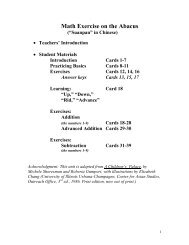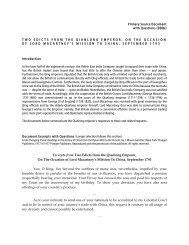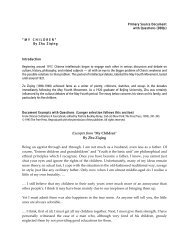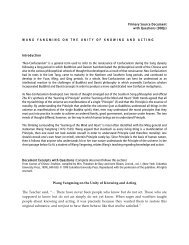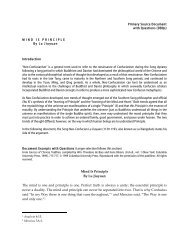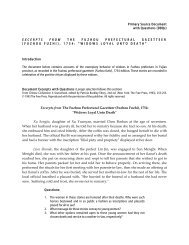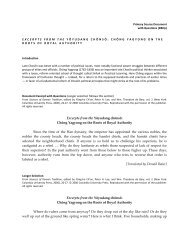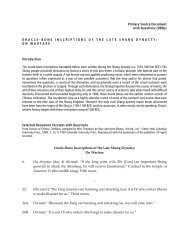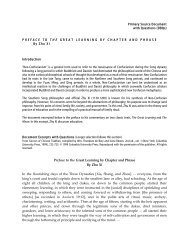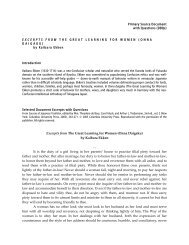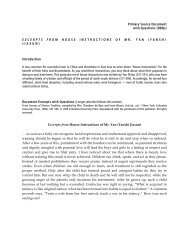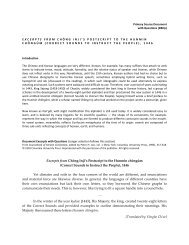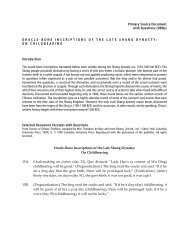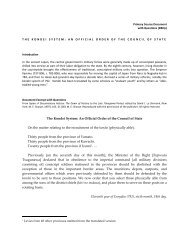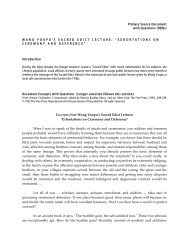The Great Tang Code: Article 6, "The Ten Abominations" - Asia for ...
The Great Tang Code: Article 6, "The Ten Abominations" - Asia for ...
The Great Tang Code: Article 6, "The Ten Abominations" - Asia for ...
You also want an ePaper? Increase the reach of your titles
YUMPU automatically turns print PDFs into web optimized ePapers that Google loves.
S E L E C T I O N S F R O M T H E G R E A T T A N G C O D E :<br />
A R T I C L E 6 , “ T H E T E N A B O M I N A T I O N S ”<br />
B y Z h a n g s u n W u j i<br />
Introduction<br />
Primary Source Document<br />
with Questions (DBQs)<br />
Law, in the sense of pronouncements from a ruler describing offensive behavior and prescribing punishments <strong>for</strong><br />
such behavior, dates back to the edicts of the kings of the Western Zhou dynasty (1046-771 BCE). Later, in the sixth<br />
century BCE (during the Warring States period), rulers of some of the many constituent states of the Zhou feudal<br />
kingdom issued their own penal laws and cast them on bronze vessels. Subsequent dynastic governments, while<br />
subscribing to Confucian political and moral philosophy, also followed the practical “Legalist” expedient of having<br />
codified laws. <strong>The</strong> <strong>Great</strong> <strong>Tang</strong> <strong>Code</strong> thus grew out of a long tradition of law-making which included the laws of Qin,<br />
Han, and Sui. <strong>The</strong> <strong>Tang</strong> <strong>Code</strong> is, however, the earliest Chinese legal code that we have in its complete <strong>for</strong>m. <strong>The</strong> <strong>Tang</strong><br />
<strong>Code</strong> served as a model <strong>for</strong> all subsequent dynastic codes of law, including those of the Song, Ming, and Qing<br />
dynasties.<br />
<strong>The</strong> <strong>Tang</strong> <strong>Code</strong> is organized into two main parts: general principles and specific offenses. In the section of specific<br />
offenses, each offense is named, and the appropriate punishment is prescribed. Over the years, the <strong>Tang</strong> <strong>Code</strong> was<br />
supplemented with commentaries and subcommentaries which assisted county magistrates and their superiors at<br />
the provincial and imperial levels of government in applying the code to individual offenses. <strong>The</strong> text of the code<br />
itself is attributed to Zhangsun Wuji (d. 659 CE), a high-ranking official and brother-in-law of Emperor <strong>Tang</strong> Taizong<br />
(r. 627-650 CE). <strong>The</strong> portion below describes the “<strong>Ten</strong> Abominations” -- the ten most serious offenses a person could<br />
commit. <strong>The</strong> penalties <strong>for</strong> “plotting rebellion,” “plotting great sedition,” and “plotting treason” called <strong>for</strong> punishment<br />
not only of the individual incriminated in the plot, but also of that person’s entire family -- parents, children, brothers,<br />
and sisters -- who were liable <strong>for</strong> penalties up to and including execution.<br />
Document Exce rpts with Que stions (Longer selection follows this section)<br />
From Sources of Chinese Tradition, compiled by Wm. <strong>The</strong>odore de Bary and Irene Bloom, 2nd ed., vol. 1 (New York: Columbia<br />
University Press, 1999), 549-552. © 1999 Columbia University Press. Reproduced with the permission of the publisher. All rights<br />
reserved.<br />
Selections from <strong>The</strong> <strong>Great</strong> <strong>Tang</strong> <strong>Code</strong>: <br />
<strong>Article</strong> 6, “<strong>The</strong> <strong>Ten</strong> Abominations” <br />
By Zhangsun Wuji <br />
<br />
Subcommentary: <strong>The</strong> ten abominations (shie) are the most serious of those offenses that come <br />
within the five punishments. <strong>The</strong>y injure traditional norms and destroy ceremony. <strong>The</strong>y are <br />
specially placed near the head of this chapter in order to serve as a clear warning. <strong>The</strong> number <br />
of extreme abominations being classified as ten is the reason why they are called the ten <br />
abominations. … <br />
<strong>Article</strong>: <strong>The</strong> first is called plotting rebellion (moufan).
Primary Source Document, with Que stions (DBQs) on S EL EC TI ON S F ROM THE GREA T TA NG CODE:<br />
A RTICLE 6, “THE TEN A BOMINATIONS,” BY ZHA NGSUN WUJI<br />
Subcommentary: <strong>The</strong> Gongyang Commentary states: “<strong>The</strong> ruler or parent has no harborers [of <br />
plots]. If he does have such harborers, he must put them to death.” This means that if there are <br />
those who harbor rebellious hearts that would harm the ruler or father, he must then put them <br />
to death. <strong>The</strong> Zuo Commentary (Zuozhuan) states: “When the seasons of Heaven are reversed, we <br />
have calamities … when the virtues of men are reversed, we have disorders.” <br />
<strong>The</strong> king occupies the most honorable position and receives Heaven’s precious decrees. Like <br />
Heaven and Earth, he acts to shelter and support, thus serving as the father and mother of the <br />
masses. As his children, as his subjects, they must be loyal and filial. Should they dare to cherish <br />
wickedness and have rebellious hearts, however, they will run counter to Heaven’s constancy <br />
and violate human principle. <strong>The</strong>re<strong>for</strong>e this is called plotting rebellion. <br />
<br />
Questions:<br />
1. What kinds of language and metaphors does the author of the <strong>Tang</strong> <strong>Code</strong><br />
use to describe “plotting rebellion”?<br />
2. How does the language used here help to underline the seriousness of the<br />
offense?<br />
Subcommentary: <strong>The</strong> kindness of father and mother is like “great Heaven, illimitable.” <br />
“Entering into the inheritance of our ancestors,” we may not be frivolous. Let one’s heart be like <br />
the xiao bird or the jing beast, 1 and then love and respect both cease. Those whose relationship is <br />
within the five degrees of mourning are the closest of kin. For them to kill each other is the <br />
extreme abomination and the utmost in rebellion, destroying and casting aside human <br />
principles. <strong>The</strong>re<strong>for</strong>e this is called contumacy. <br />
Commentary: Contumacy means to beat or plot to kill [without actually killing] one’s <br />
paternal grandparents or parents; or to kill one’s paternal uncles or their wives, or one’s elder <br />
brothers or sisters, or one’s maternal grandparents, or one’s husband, or one’s husband’s <br />
paternal grandparents, or his parents. … <br />
Questions:<br />
3. <strong>The</strong>se passages from the subcommentary and commentary describe the<br />
fourth of the “ten abominations” -- contumacy. Why should this offense of<br />
beating or plotting to kill certain family members be considered as one of<br />
the ten most serious offenses from the point of view of the <strong>Tang</strong> imperial<br />
government?<br />
<strong>Article</strong>: <strong>The</strong> fifth is called depravity (budao). <br />
Subcommentary: This article describes those who are cruel and malicious and who turn their <br />
backs on morality. <strong>The</strong>re<strong>for</strong>e it is called depravity. <br />
Commentary: Depravity means to kill three members of a single household (jia) who have <br />
not committed a capital crime, or to dismember someone. … <br />
<br />
1 <strong>The</strong> earliest Chinese dictionary, the Shouwen jiezi, describes the xiao as an unfilial bird that eats its <br />
mother, coupling it with the jing, an unfilial beast that eats its father. <br />
<strong>Asia</strong> <strong>for</strong> E duca tors | Columbia University | http ://afe.easia.columbia.edu Page 2 of 6
Primary Source Document, with Que stions (DBQs) on S EL EC TI ON S F ROM THE GREA T TA NG CODE:<br />
A RTICLE 6, “THE TEN A BOMINATIONS,” BY ZHA NGSUN WUJI<br />
Commentary: <strong>The</strong> offense also includes the making or keeping of poison (gu) or sorcery. <br />
Subcommentary: This means to prepare the poison oneself, or to keep it, or to give it to others <br />
in order to harm people. But if the preparation of the poison has not yet been completed, this <br />
offense does not come under the ten abominations. As to sorcery, there are a great many <br />
methods, not all of which can be described. All, however, comprise evil customs and secret <br />
practices that are illegal and whose intent is to cause the victim pain and death. <br />
<br />
Questions:<br />
<br />
4. How well-defined is this offense of “depravity”?<br />
5. What might be the purpose of the authors of the <strong>Code</strong> and the<br />
subcommentary and commentary in defining the offense in this particular<br />
way?<br />
<br />
<strong>Article</strong>: <strong>The</strong> seventh is called lack of filiality (buxiao). <br />
Subcommentary: Serving one’s parents well is called filiality. Disobeying them is called lack <br />
of filiality. <br />
Commentary: This has reference to accusing to the court or cursing one’s paternal <br />
grandparents or parents. … <br />
<br />
Questions:<br />
<br />
6. A legal code generally prohibits behavior that is thought to be particularly<br />
threatening to the government and to society. Why should “lack of filiality”<br />
be written into the law as an offense -- and as one of the ten most serious<br />
offenses at that?<br />
Longe r Se le ction<br />
From Sources of Chinese Tradition, compiled by Wm. <strong>The</strong>odore de Bary and Irene Bloom, 2nd ed., vol. 1 (New York: Columbia<br />
University Press, 1999), 549-552. © 1999 Columbia University Press. Reproduced with the permission of the publisher. All rights<br />
reserved.<br />
Selections from <strong>The</strong> <strong>Great</strong> <strong>Tang</strong> <strong>Code</strong>: <br />
<strong>Article</strong> 6, “<strong>The</strong> <strong>Ten</strong> Abominations” <br />
By Zhangsun Wuji <br />
<br />
Subcommentary: <strong>The</strong> ten abominations (shie) are the most serious of those offenses that come <br />
within the five punishments. <strong>The</strong>y injure traditional norms and destroy ceremony. <strong>The</strong>y are <br />
specially placed near the head of this chapter in order to serve as a clear warning. <strong>The</strong> number <br />
of extreme abominations being classified as ten is the reason why they are called the ten <br />
abominations. … <br />
<br />
<strong>Asia</strong> <strong>for</strong> E duca tors | Columbia University | http ://afe.easia.columbia.edu Page 3 of 6
Primary Source Document, with Que stions (DBQs) on S EL EC TI ON S F ROM THE GREA T TA NG CODE:<br />
A RTICLE 6, “THE TEN A BOMINATIONS,” BY ZHA NGSUN WUJI<br />
<strong>Article</strong>: <strong>The</strong> first is called plotting rebellion (moufan). <br />
Subcommentary: <strong>The</strong> Gongyang Commentary states: “<strong>The</strong> ruler or parent has no harborers [of <br />
plots]. If he does have such harborers, he must put them to death.” This means that if there are <br />
those who harbor rebellious hearts that would harm the ruler or father, he must then put them <br />
to death. <strong>The</strong> Zuo Commentary (Zuozhuan) states: “When the seasons of Heaven are reversed, we <br />
have calamities … when the virtues of men are reversed, we have disorders.” <br />
<strong>The</strong> king occupies the most honorable position and receives Heaven’s precious decrees. Like <br />
Heaven and Earth, he acts to shelter and support, thus serving as the father and mother of the <br />
masses. As his children, as his subjects, they must be loyal and filial. Should they dare to cherish <br />
wickedness and have rebellious hearts, however, they will run counter to Heaven’s constancy <br />
and violate human principle. <strong>The</strong>re<strong>for</strong>e this is called plotting rebellion. <br />
Commentary: Plotting rebellion means to plot to endanger the Altars of Soil and Grain [sheji, <br />
that is, the ruler and the state that he rules]. <br />
Subcommentary: She is the spirit of the five colors of soil [corresponding to the Five Phases). Ji <br />
is the regulator of the fields, which uses the spirits’ earthly virtue to control the harvest. <strong>The</strong> <br />
ruler is the lord of these spirits of agriculture. <strong>The</strong> food that they ensure is as Heaven to the <br />
people. When their lord is in peace, these spirits are at rest. When the spirits are in repose, the <br />
seasons give a plentiful harvest. <br />
However, ministers and subjects may plot and scheme to rebel against traditional norms <br />
and have minds that would discard their ruler. If the ruler’s position is endangered, what will <br />
the spirits rely upon? Not daring to make direct allusion to the honored name of the ruler, we <br />
there<strong>for</strong>e use the phrase “Altars of Soil and Grain” to designate him. <strong>The</strong> Rites of Zhou states: <br />
“On the left the Temple of the Ancestors, on the right the Altar of the Soil.” <strong>The</strong>se are what the <br />
ruler honors. <br />
<br />
<strong>Article</strong>: <strong>The</strong> second is called plotting great sedition (mou dani). <br />
Subcommentary: This type of person breaks laws and destroys order, is against traditional <br />
norms, and goes contrary to virtue. <strong>The</strong>re can be no greater sedition. <strong>The</strong>re<strong>for</strong>e it is called great <br />
sedition. <br />
Commentary: Plotting great sedition means to plot to destroy the ancestral temples, tombs, or <br />
palaces of the reigning house. <br />
Subcommentary: <strong>The</strong>re are persons who “offend against Heaven,” “who do not know where <br />
to stop,” and who secretly think of letting loose their hatred. Planning recklessness, they <br />
conceive evil thoughts and plot destruction of the ancestral temples, tombs, or palaces of the <br />
reigning house. … <br />
<br />
<strong>Article</strong>: <strong>The</strong> third is called plotting treason (mou pan). <br />
Subcommentary: <strong>The</strong> kindness of father and mother is like “great Heaven, illimitable.” <br />
“Entering into the inheritance of our ancestors,” we may not be frivolous. Let one’s heart be like <br />
the xiao bird or the jing beast, 2 and then love and respect both cease. Those whose relationship is <br />
<br />
2 See footnote 1, above. <br />
<strong>Asia</strong> <strong>for</strong> E duca tors | Columbia University | http ://afe.easia.columbia.edu Page 4 of 6
Primary Source Document, with Que stions (DBQs) on S EL EC TI ON S F ROM THE GREA T TA NG CODE:<br />
A RTICLE 6, “THE TEN A BOMINATIONS,” BY ZHA NGSUN WUJI<br />
within the five degrees of mourning are the closest of kin. For them to kill each other is the <br />
extreme abomination and the utmost in rebellion, destroying and casting aside human <br />
principles. <strong>The</strong>re<strong>for</strong>e this is called contumacy. <br />
Commentary: Contumacy means to beat or plot to kill [without actually killing] one’s <br />
paternal grandparents or parents; or to kill one’s paternal uncles or their wives, or one’s elder <br />
brothers or sisters, or one’s maternal grandparents, or one’s husband, or one’s husband’s <br />
paternal grandparents, or his parents. … <br />
<br />
<strong>Article</strong>: <strong>The</strong> fifth is called depravity (budao). <br />
Subcommentary: This article describes those who are cruel and malicious and who turn their <br />
backs on morality. <strong>The</strong>re<strong>for</strong>e it is called depravity. <br />
Commentary: Depravity means to kill three members of a single household (jia) who have <br />
not committed a capital crime, or to dismember someone. … <br />
Commentary: <strong>The</strong> offense also includes the making or keeping of poison (gu) or sorcery. <br />
Subcommentary: This means to prepare the poison oneself, or to keep it, or to give it to others <br />
in order to harm people. But if the preparation of the poison has not yet been completed, this <br />
offense does not come under the ten abominations. As to sorcery, there are a great many <br />
methods, not all of which can be described. All, however, comprise evil customs and secret <br />
practices that are illegal and whose intent is to cause the victim pain and death. <br />
<br />
<strong>Article</strong>: <strong>The</strong> sixth is called great irreverence (da bujing). <br />
Subcommentary: Rites are the root of reverence; reverence is the expression of rites. <br />
<strong>The</strong>re<strong>for</strong>e, “<strong>The</strong> Evolution of Rites” [chapter of the Record of Rites] states: “Rites are the great <br />
instrument of the ruler. It is by them that he resolves what is doubtful and brings to light what <br />
is abstruse … examines institutions and regulations, and distinguishes humaneness and <br />
rightness.” <strong>The</strong> responsibility of those who offend against ritual is great and their hearts lack <br />
reverence and respect. <strong>The</strong>re<strong>for</strong>e it is called great irreverence. … <br />
Commentary: <strong>Great</strong> irreverence means to steal the objects of the great sacrifices to the spirits <br />
or the carriage or possessions of the emperor. <br />
<br />
<strong>Article</strong>: <strong>The</strong> seventh is called lack of filiality (buxiao). <br />
Subcommentary: Serving one’s parents well is called filiality. Disobeying them is called lack <br />
of filiality. <br />
Commentary: This has reference to accusing to the court or cursing one’s paternal <br />
grandparents or parents. … <br />
<br />
<strong>Article</strong>: <strong>The</strong> ninth is called what is not right (buyi). <br />
Subcommentary: Rites (ritual decorum) honor rightness. This section originally did not <br />
include blood relatives because, basically, rightness is exercised only toward associates. It is <br />
concerned with turning one’s back on rightness and violating humaneness. … <strong>The</strong>re<strong>for</strong>e it is <br />
called “what is not right.” <br />
<strong>Asia</strong> <strong>for</strong> E duca tors | Columbia University | http ://afe.easia.columbia.edu Page 5 of 6
Primary Source Document, with Que stions (DBQs) on S EL EC TI ON S F ROM THE GREA T TA NG CODE:<br />
A RTICLE 6, “THE TEN A BOMINATIONS,” BY ZHA NGSUN WUJI<br />
Commentary: [This] means to kill one’s department head, prefect, or magistrate, or the <br />
teacher from whom one has received one’s education. … <br />
<br />
<strong>Article</strong>: <strong>The</strong> tenth is called incest (neiluan). <br />
Subcommentary: <strong>The</strong> Zuo Commentary (Zuozhuan) states: “<strong>The</strong> woman has her husband’s <br />
house; the man has his wife’s chamber; and there must be no defilement on either side.” If this <br />
is changed, then there is incest. If one behaves like the birds and beasts 3 and introduces <br />
licentious associates into one’s family, the rules of morality are confused. <strong>The</strong>re<strong>for</strong>e this is called <br />
incest. <br />
Commentary: This section includes having illicit sexual intercourse (jian) with relatives who <br />
are of the fourth degree of mourning or closer. … <br />
<br />
<br />
<br />
3 This refers to the passage in “<strong>The</strong> Rules of Propriety” (“Qu li”), Record of Rites, where it is stated that <br />
animals have no morality; the stag and his male offspring both couple with the same doe. <br />
<strong>Asia</strong> <strong>for</strong> E duca tors | Columbia University | http ://afe.easia.columbia.edu Page 6 of 6



